


Ms. Gaynor Pais, CEO of IRFT was invited to attend the Co-op’s 6th Annual Ethical Trade Supplier Event at Manchester, UK for Food own-brand suppliers, meant to deliberate on Co-op’s ambitions to treat people fairly, making sure that producers of food get a fair deal. IRFT was invited to present the success story of the Mack Multiples / Sainsbury Indian Grape Project to a peer group of Ethical Traders of food products showing how working with in country NGOs ensure that projects are effectively managed at a local level.
‘Developing A More Sustainable Indian Table Grape Industry’ a Three-Year project to address issues on insecurity and long-term business sustainability and profitability of grape farmers due to product quality, agronomic practices and low – skilled transient workforce, low level of awareness and expectation of labour and human rights among largely female migrant workers at grape farms and at the processing levels.
Year I was specifically based on comprehending the on-ground situation through the Needs Assessment and Baseline survey to provide a quantitative and qualitative information on the economic, social and personal challenges faced by 35 Permanent Farm Workers, 70 Migrant Farm Workers, 150 Packhouse operators and employees working under the 7 exporters of grapes to Sainsbury.
Based on our Desk and Field Research, Interviews, Focus and Group Discussions with all the target groups, an Implementing plan was perceived.
‘Premal Kutumb’ - One big loving family in Unity was conceived with an intent to build a rapport and ownership commitment between the 7 growers and their workforce
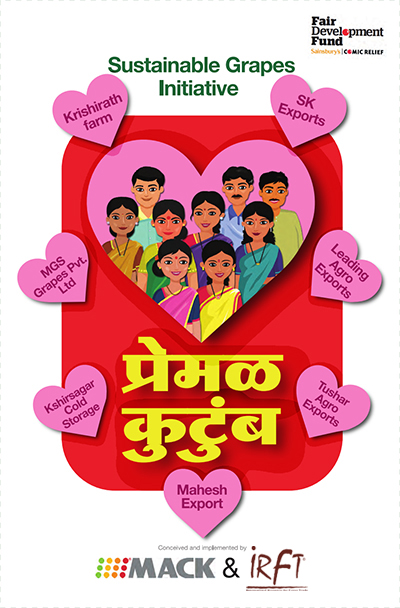
Personal candid interviews gave an insight into the active, vibrant, committed and united women workforce willing to earn a supplementary income for their family. This gave impetus to propose areas of intervention in consonance with women in the communities.
‘Wealth from Waste’
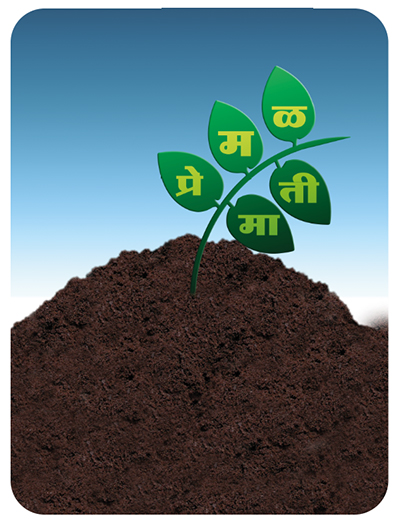
The Compost Project not only improved livelihoods, but encouraged savings, health and sanitation and a clean environment.
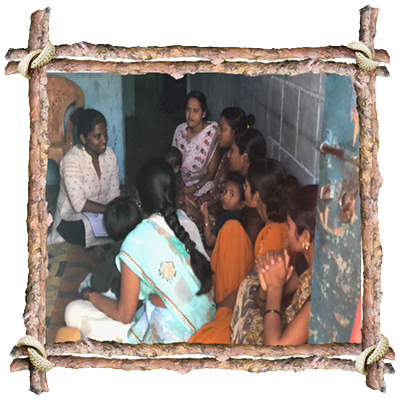
An attempt to track our progress with the communities that we have mobilized so far, Jiti Chathamala, a new recruit from IRFT – International Resources for Fairer Trade, was entrusted with this task, to meet the women and chat with them informally about their inspirations, aspirations, their feelings, their experiences and challenges, and anything they wanted to say about the Premal Kutumbh and Premal Mati project.
This was done on camera and will be a part of the documentary film that will be created at the end of the project. The discussions have been summarized in a questionnaire format from which we will create stories and small video clips to upload on the webpage devoted to the project on ‘Developing A More Sustainable India Table Grape Industry’:
On what basis did you choose members for this group? (Selection process)
We made sure that only those who have time available for this work, without making any excuses and those that have a genuine interest in working together are added in the group.
Who takes lead on day to day functioning of your group? (activities)
We are not able to take names individually because each and every one of us equally contribute in the activities daily.
What was your personal contribution to the group’s performance? (discipline, punctuality, accountability, motivation, co-operation)
Making the kitchen waste into fine pieces and depositing it into our tumblers, twice a day without fail and also reminding others to do the same. We have also motivated our families to do so in our absence.
Are you satisfied with the functioning of your Group? (Yes/No) reason
Initially the level of Mati we generated was very less as we were learning. But now we are slowly increasing the production. So Yes, we are satisfied with our functioning but intend to improve ourselves in functioning better.
What do you think is the objective of this project? (उद्देश्य)
Project must be intending to make our community clean through us. As we always had garbage dumped all over in our surrounding areas because the Municipal Corporation truck comes once a year to take away the garbage. Secondly through cleanliness and reduction in pollution we are even able to generate extra income through Mati (manure).
Why did you choose to be a part of this initiative?
During the first meeting at PPF we had confidence in you (IRFT) as you called and spoke to us. Only because of this strong belief we had in you, we happily came ahead to jointly work with you.
What are the changes incurred within the team, from the beginning of the project till now? (after completing 10 months)
Before the project was initiated, we never had separated our garbage into kitchen waste etc. All of us had a practice of dumping the entire waste outside our houses leading to conflicts within the families in our community. However, since the tumblers are being installed now, and that too at a common place, our fights have completely stopped and our relationship with each other in the community has improved.
Did you attend any trainings after joining the group? If Yes, then did you learn new skills through the trainings? (Composting, Wealth from waste, Save wealth for future)
How has relations in the group improved? (Yes/No)
Initially we never came out of our houses and never had an interaction with others in our community unless there was a need. However, due to this project, we now come together for meetings, trainings and discussions, and have developed a good bond of friendship.
Did everyone have same opinion at the beginning? If No, how did you deal with it?
No. In the beginning we all were irregular in our task. Some didn’t separate their kitchen waste before adding into the tumbler, some weren’t regularly adding their kitchen waste. Hence, the Mati generated was very less in quantity. Due to this we even had fights. However, after talking to them and making them understand all the problems were eradicated slowly.
Have you been supportive if anyone in the group did not contribute? (Nurturing, mentoring, guiding & supporting)
All of us jointly supported and encouraged those who didn’t contribute.
How did you all gain better social status and decision-making power after joining the group?
We initially weren’t confident in taking any kind of decisions. But now after learning to take responsibilities we even started taking decisions. We even contribute in the discussion of the monthly budget plan in our homes.
Any change (behavioural change) in the mindset of people due to your work?
Initially people looked down at us, as we used to collect the waste from the community. However, after seeing that the community is becoming clean due to our efforts, they started separating their waste and now help and encourage us in sustaining this cleanliness.
Any change in the vicinity of community after the project was initiated? (Cleanliness in the surrounding, attitude of other households)
As we told you that we always had garbage dumped all over, in our surrounding areas because, the Municipal Corporation Trucks that collects the garbage come only once a year. But now those waste are no longer dumped there, which make our community clean and hygienic.
What challenges did the group face to accomplish the objective?
Initially we did not know which dry waste and which waste was with water content. Hence, we kept adding all our kitchen waste, due to which the water level in the tumbler was quite high and the rain water just messed up everything. When we were rotating the tumbler, the water from the tumbler leaked and had fell all across our lane, making the area more unclean, messy and stinky. Due to this people in the community were against our work and even stopped us from continuing our work further.
How did you deal with the challenges?
We made the people understand what we were trying to do with the waste collections. Once they saw the community getting clean slowly and steadily due to our efforts, even others started separating their waste and now help and encourage us in sustaining this cleanliness.
What made this team work successfully?
Maybe our dedication towards it and the support we got from each other.
IRFT’s role in your progress?
IRFT has been our major supporter, motivator, facilitator, enabler. IRFT has also supervised us when we were going wrong. Without IRFT, we could have never achieved what we have achieved so far.
Do you receive support from Family? (Children/Spouse/Others)? What kind of support did you receive?
Initially even our families weren’t happy with us moving out of our homes, especially our mothers-in-law. Secondly, they didn’t like our work at all. But now, in our absence they do the work of separating the waste and adding it to the tumbler. Be it children, Spouse or In-laws, all are very supportive.
Any specific learnings?
Personal changes within you?
Testimonials
I am Jyoti Jadhav,
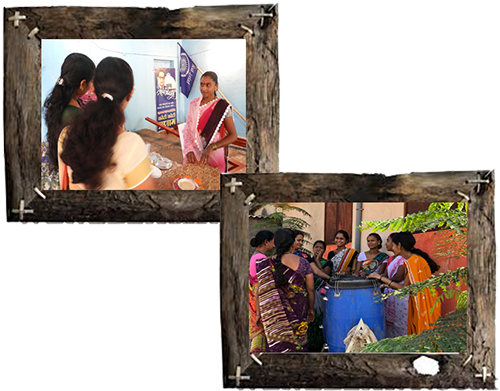
I have a story to tell you. A true story of how we the women of Naitale transformed our lives by just a show of hands and a ‘YES’ that we can try to make a difference.
What started as a mere request to work together, to collect our daily vegetable waste and put it all in a tumbler, has ended up into a movement.
The ‘Waste Warriors’ of Naitale is what we are now known as and we are proud to be an inspiration to the whole village.
The day we all sat together in one of our houses to discuss how we could be a part of a waste to wealth programme in our own village, just by collecting our waste, segregating the vegetable waste from other waste. We just needed ten volunteers to start and we were afraid, shy and not so convinced that we could do this.
Garbage sorting, collecting and mixing was unheard of in our community. It was much easier to dump it out in the open, when no one was looking. This idea seemed absurd. What wealth can be created out of garbage, we just could not fathom.
The smiling faces of the IRFT team, social workers so intent on convincing us that it was so easy if only we tried. So hesitatingly we volunteered as a group of just ten. Though our work at the packhouses had started, we were committed to our task of collecting our waste for the tumbler, motivating those who were casual and less concerned and even fighting with them to ensure that vegetable waste from ten homes entered the bin.
The first batch of ‘compost’ took such a long time as we had made the mistake of adding water, not churning it regularly and other messes. But finally, when we produced seven kilos of ‘Premal Mati’ Our joy knew no bounds. We have persisted and today we proudly produce more than 30 kilos of ‘Premal Mati’. The best part of this is that our packhouse owner – Tushar Group, buys our mati at a higher price than the market price.
It is not about the money only, its more about our Unity as a women’s group playing an important role in providing our grower with an enriched soil improver, created from our own kitchen waste. A technology that has bonded us with mother earth.
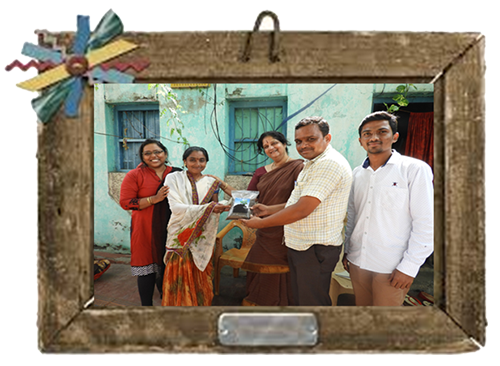
The first batch of Premal Mati, produced from our vegetable waste and of such good quality that our grower is proud to buy all the mati (compost) that we produce.
We are grateful to IRFT team for patiently teaching us the method, testing our compost for nutrient value and convincing our grower to even pay a higher price than the market price. I am Jyoti Jadhav posing with IRFT and Mr. Ram Hari of Tushar group.
I am Maalti,
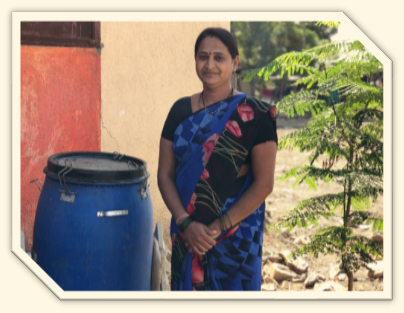
I was so shy, so reserved and kept to myself before I joined this Premal Mati group. I was not at all confident to even convince my co-members to be regular in waste collection and churning etc. Today, I am a different person. I have taken the Financial Literacy trainings so seriously to understand our household expenses and how to plan our savings is constantly on my mind. Every month I tried to save atleast minimum Rs.200/- last season. The next season my target is Rs.350/- per month. I am saving for my son’s marriage, something I could never even think of as I felt is was my husband’s duty to plan. The Premal Mati project has brought new excitement to the village. The same people who made fund of our Premal Mati group, now look at us with respect. Every day we have requests from others in the village to enter their names to form a new group
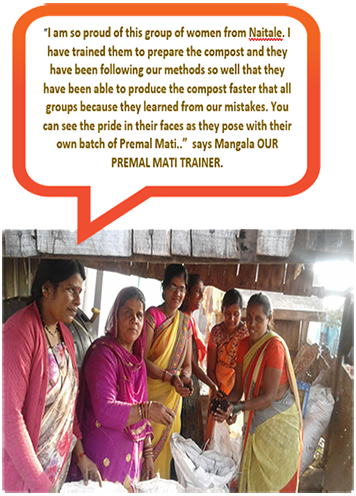
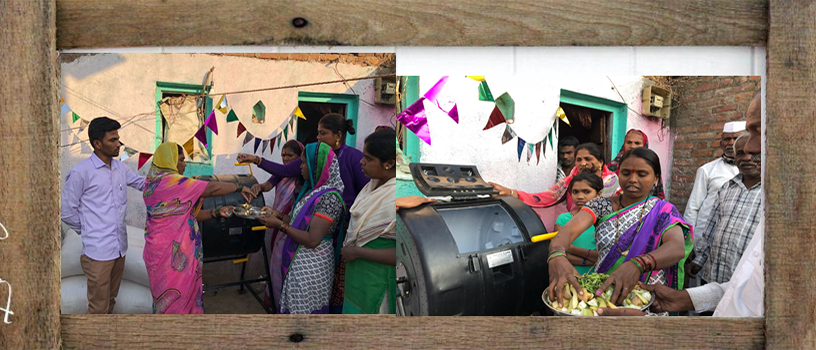
Before the project we were dumping waste outside our houses and this caused the whole area to be littered with garbage. More than the dirt and stench we women fought with each other over these issues accusing each other of creating a mess in the village.
Today we are so united that all we are bothered about is our Premal Mati and that has helped us to become a Premal Kutumb (happy loving family). A new group is formed, and we are showering our blessings on our new compost tumbler as if it is a newly born family member! this is our tradition
I am Mangala,
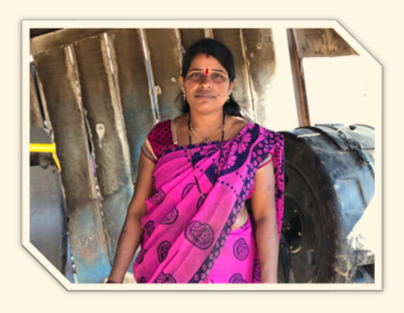
I am proud to be a part of the first group to produce Premal Mati. We faced many challenges with the first group of the community as well as in trying to understand the process. Our first batch of mati took 90 days to be processed, but the pride we felt in being part of the pilot project can be seen in the success story of six more groups formed after us. Our mistakes became learning lessons for the other groups and best of all we are now trainers to the other groups.
I am an ‘Asha Worker’ but the pride and respect I have been given from Premal Mati is greater than what I received as an ‘Asha Worker’ Maybe because I have been motivated by IRFT and I can now motivate other women to lead by my example. We must increase our trainers so that this process can be adopted in many more villages in our grape belt
Financial Trainings
The workers had no understanding of sustained funds for unforeseen expenses or saving on regular basis and were overdependent on loans and advances from the growers. Three Financial Literacy Trainings were conducted
The First Financial Literacy Training Programme for the Naitale Community was based on basics of finance, savings, loans and daily expenses.
The Second Financial Literacy Training Programme for the Naitale Community was based on Self -Assessment, Marketing techniques, Sales strategy, Business Feasibility and Budgeting.
‘Premal Bachat Box’ was distributed to the community members to encourage saving of Rs.5/- per day.
The Third Financial Literacy Camp for 4 Packhouse workers was on planning and saving and getting acquainted with all the Government Schemes through their Jan Dhan Accounts.
Health Camps: Monitoring the Health issues
Bone density and gynecological checkups along with prescriptions were conducted by Dr. Minal & Dr. Nilesh for 83 patients at Naitale
Children Club: Drawing competition being conducted for the community children
Growers Meeting – World Fair Trade Week: Discussing about the past performance and future planning with growers
Our New Group Mobilization